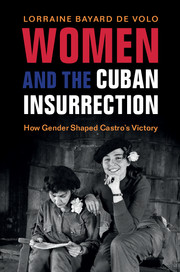Book contents
- Women and the Cuban Insurrection
- Women and the Cuban Insurrection
- Copyright page
- Dedication
- Contents
- Preface
- 1 Revolution Retold
- 2 “How Can Men Tire When Women Are Tireless?”
- 3 A Movement Is Born
- 4 Abeyance and Resurgence
- 5 Gendered Rebels
- 6 War Stories Celebrated and Silenced
- 7 “Stop the Murders of Our Children”
- 8 Masculinity and the Guerrilla War of Ideas
- 9 Women Noncombatants
- 10 Las Marianas
- 11 Past Is Prologue
- Bibliography
- Index
1 - Revolution Retold: What a Gender Lens Tells Us about the Cuban Insurrection
Published online by Cambridge University Press: 19 January 2018
- Women and the Cuban Insurrection
- Women and the Cuban Insurrection
- Copyright page
- Dedication
- Contents
- Preface
- 1 Revolution Retold
- 2 “How Can Men Tire When Women Are Tireless?”
- 3 A Movement Is Born
- 4 Abeyance and Resurgence
- 5 Gendered Rebels
- 6 War Stories Celebrated and Silenced
- 7 “Stop the Murders of Our Children”
- 8 Masculinity and the Guerrilla War of Ideas
- 9 Women Noncombatants
- 10 Las Marianas
- 11 Past Is Prologue
- Bibliography
- Index
Summary
A photo by Spanish photojournalist Enrique Meneses portrays Fidel Castro reclining in a guerrilla camp at night, reading by candlelight. With the caption “Fidel Castro in the Sierra Maestra,” he is framed as the subject of this photo. But what caught my eye and my imagination is the woman to his right, who sits beside him, head bowed, holding the candle for Fidel to read by. Who is she? Meneses does not tell us. In all likelihood, she is a bit actor who played a minor role in the insurrection. But without her and many more like her, Fidel would never have succeeded.
This book is, in part, a people's history of the Cuban insurrection. The focus is principally but not exclusively upon women, whose history of activism has been acknowledged but remains largely unexplored. Given the spotlight trained upon Fidel Castro and Che Guevara, and to a lesser extent other rebel leaders, a focus that includes rank and file women forces one off the literature's center stage to inquire about those who held the candle for Fidel to read by, smuggled messages down the mountain, planted bombs in theaters, or hid rebels in their home. These are decidedly not the bearded rebels romanticized (or vilified) in the literature. Indeed, some guerrilla combatants were women. Such women combatants inform the post-1958 Cuban official historical narrative, the Cuban War Story central to the construction of the New Woman in the new revolutionary society. But the attention to armed combatants – men and women alike – obscures two essential elements of the insurrection. First, as this study makes clear, insurrections are not only won or lost through bullets and battlefield heroics but through the more mundane tasks that women and lower-status men perform. Second, the Cuban War Story featuring guerrilla warfare obscures the battle for hearts and minds. The Castro-led July 26 Movement (M-26-7) put considerable effort into this latter battle, and women were central as both strategists and gendered subjects. This foray into a women's history of the Cuban insurrection aims not only to right the past wrongs of women's exclusion, important as that is.
- Type
- Chapter
- Information
- Women and the Cuban InsurrectionHow Gender Shaped Castro's Victory, pp. 1 - 22Publisher: Cambridge University PressPrint publication year: 2018



